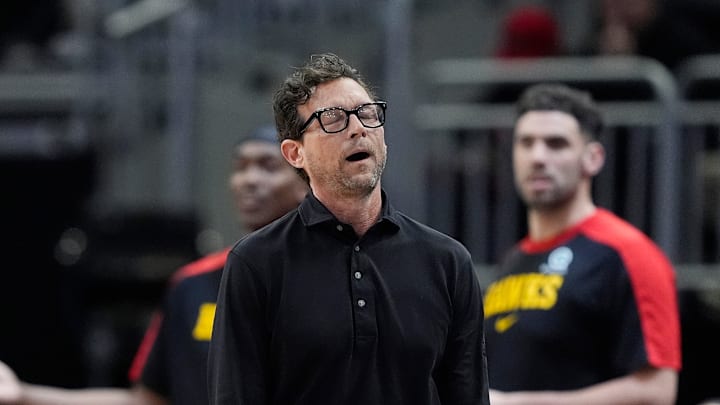The Atlanta Hawks would like to forget their start to the 2025-26 season, which began 1-3 and saw the loss of star Trae Young for at least a month due to a right MCL sprain. While it’s not time to hit the panic button per se, the Hawks need to hit an internal panic button to plug the holes that are sinking their season.
The most frustrating part of the Hawks' season is that their losses seem very preventable, and their struggle in transition defense underscores this conclusion. When the Hawks lose, they have allowed 28.0 fast break points; when they win, they average 9.3 transition points allowed.
Their inconsistent transition defense is the primary reason the team has struggled out the gate this season. While there are certainly other factors, such as poor shooting from key players and a lack of chemistry from a new team, this has been both their most impactful and preventable flaw.
The Hawks will instantly right the ship if they focus on getting back on D
The most concerning part of Atlanta’s transition defense struggles is that transition defense is not a matter of skill or athleticism; it’s a matter of effort. This is perhaps overly simplistic, but the truth is that if you get more bodies back in transition than the offense pushes forward, you will stifle the fast break. At the very least, you will buy time to mitigate the advantage created by the offense.
But Atlanta has not been running back. A common occurrence in a Hawks game is someone will make a turnover or miss a shot, then pause for a few moments before jogging back. Another sight fans are all too familiar with is when only one Hawk hustles back on D, leaving them outnumbered and helpless to stop the offensive attack.
This just can’t happen in an NBA game. The Hawks have the talent and depth to win any game on any given night. But if scrappier teams are outworking them, they will fail to leap Eastern Conference contenders as expected this season.
If anyone is to blame, it is the leadership. Quin Snyder, Trae Young, and Kristaps Porzingis are three veterans in their respective roles who should take it upon themselves to keep the young guys in check and motivated. Snyder and Young are excellent leaders by all (recent) accounts, and Porzingis said he was ready to provide championship experience and leadership to a young team in the preseason.
It’s ironic that these three are the leaders who bear responsibility, as there is nothing they can do to solve the problem. Snyder is a coach; Young is sidelined for another month; and Porzingis’s health and mobility make him unable to run the length of the floor as effectively as opposing wings. This will be a true test of their leadership: can they motivate guys to do something they physically cannot?
If they can, Atlanta should be able to survive Young’s absence and finish with a respectable record. If they cannot, the season could be a lost cause by the time Young returns.
